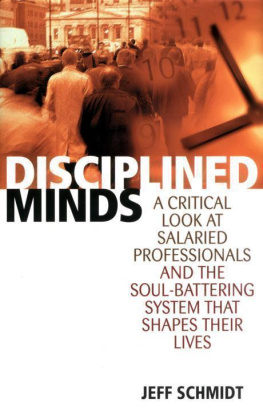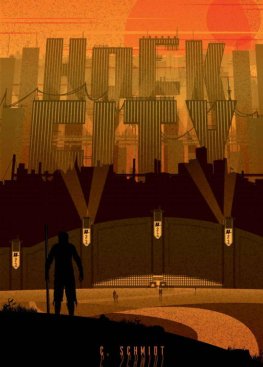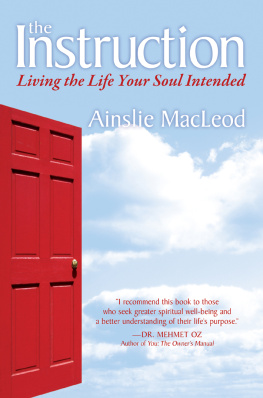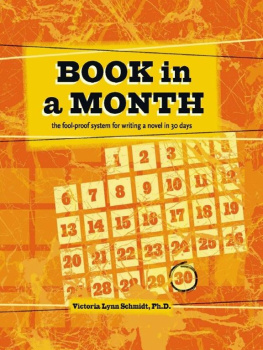JEFF SCHMIDT





For my daughter,
Joshua Rose
vii
I
Part One: Professionals
Trusted Cadre
Hidden Curriculum
Overview
The Politics of Not Getting Political
The Expert's Opinion
When Does a Job Demand a Professional?
Working Between the Lines
Jurors: Professionals for a Week
Inadvertent Satirists
"Real World" Credentials
Directing the Professor's Curiosity
A Government Agency Is a Government Agency
Condensed Matter Physics
Plasma Physics
It Takes a Professional
Weakening the Individual
Part Two: Selection
Dreams of Escape
Opportunity to Escape
A Life-and-Death Matter
Ugly Scene at the Narrow Gate
A Strategy for Understanding
Selection as a Political Process
The Instrument of Selection
Before the Narrowing
Metamorphosis and Unnatural Selection
Admission
Courses
Qualification
Research
Employment
The Convergence of Prejudgment and Score
Imposing a Social Framework
Turning Tricks
Time Pressure and Problem Fragments
Boredom and Endurance
Technical Details, Naked Formulas and "Usefulness"
The Elitist's Advantage
Bias-Necessary and Unnecessary, Hidden and Superficial
Freudian Slips
Professionalism
Conflicts with Employers
Preprofessionals
Part Three: Resistance
Brainwashing and Resistance
Prisoner of War Resistance
Confrontation or Obliteration
My Own Case
Individual Violence
Many people helped to create this book.
The always-inspiring Stanley Aronowitz, an extraordinarily insightful social critic whom I've had the pleasure of knowing for many years, did a great deal to make the book a reality. His comments on the manuscript helped to improve the book's content, and his generosity and principled solidarity played a crucial role in getting it published.
My parents, Esther and Jerry Schmidt, gave me more than moral support. My mother has been a lifelong role model for treating people decently, and the values inherent in her example helped shape this book. My father's long-standing activism taught me that action is the bottom line. I lis spirited suggestions on all facets of the book project always reminded me to keep the big picture in mind.
Jean Kumagai made important contributions to the book on all levels, from the basic ideas to the subtle details of how they are expressed. Her insight into today's society and culture was invaluable. Matt Siegel also made invaluable contributions to all aspects of the project. His independent thinking often led me to rethink ideas or to present them more clearly. Chris Mohr gave me scores of good editing suggestions and shared his knowledge of the publishing industry. Bill Sweet read the manuscript with a sharp eye and offered many thoughtful suggestions, both broad and detailed. I first met my friends jean, Matt, Chris and Bill when they were hired at Physics Today magazine and thus became my coworkers. Our many fruitful discussions about topics in the book, and about their own projects, made our workdays more interesting and more satisfying.
Others who contributed generously of their time and who offered support and valuable suggestions include Charlotte Miller, Daniel Gladstone (another friend from the Physics Today workplace), William DiFazio, Michael Berube, Noam Chomskv, Liane Scott, Michael Balter, Eric Chase, Maude Covalt, Sam Ma, Cecily Stewart, Margaret Boeringer, Frank Potter, Pat Kerig, Ted Werntz, Robin Hanson, Robert N. Proctor, Fred Dolan, Alak Ray, Keith Skotnes, Marlowe Hood (another friend from the magazine), Shawna Vogel, Michael Neuschatz and Barbara Dixon.
The Education and Employment Statistics division of the American Institute of Physics, just down the hall from the Physics Today offices, provided lots of useful data.
Phil Mattera of the National Writers Union set an example for all unionists, and indeed for all workers, by looking critically not only at the terms of production, but also at what was being produced: He helped me get a great book contract and gave me excellent suggestions for improving the manuscript.
Dean Birkenkamp, my editor at Rowman & Littlefield is everything a writer could want. He has maintained his own social vision and high standards of personal conduct within an increasingly corporate publishing industry that sees such priorities as inefficient at best. Dean was enthusiastic about the book and signed it up promptly. He offered wise global and detailed suggestions and worked closely with me at each step in the publishing process.
It was not easy.... It needed ... a sort of athleticism of mind, an ability at one moment to make the most delicate use of logic and at the next to be unconscious of the crudest logical errors. Stupidity was as necessary as intelligence, and as difficult to attain.
George Orwell, 1984

This book is stolen. Written in part on stolen time, that is. I felt I had no choice but to do it that way. Like millions of others who work for a living, I was giving most of my prime time to my employer. My job simply didn't leave me enough energy for a major project of my own, and no one was about to hire me to pursue my own vision, especially given my irreverent attitude toward employers. I was working in New York City as an editor at a glossy science magazine, but my job, like most professional jobs, was not intellectually challenging and allowed only the most constrained creativity. I knew that if 'I were not contending with real intellectual challenges and exercising real creativity-and if I were not doing anything to shape the world according to my own ideals-life would be unsatisfying, not to mention stressful and unexciting. The thought of just accepting my situation seemed insane. So I began spending some office time on my own work, dumped my TV to reappropriate some of my time at home, and wrote this book. Not coincidentally, it is about professionals, their role in society, and the hidden battle over personal identity that rages in professional education and employment.
The predicament I was in will sound painfully familiar to many professionals. Indeed, generally speaking, professionals today are not happy campers. After years of worshiping work, many seemingly successful professionals are disheartened and burned out, not because of their 70-hour workweeks, but because their salaries are all they have to show for their life-consuming efforts. They long for psychic rewards, but their employers' emphasis on control and the bottom line is giving them only increased workloads, closer scrutiny by management and unprecedented anxiety about job security. In this way the cold reality of employer priorities has led to personal crises for many of this country's 21 million professionals.












